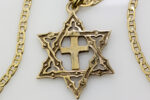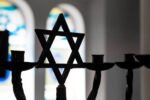The answer depends on what Jewish community you choose for yourselves, and later, on how and where your children’s Jewish journeys take them.
“My wife isn’t Jewish but we are raising our children Jewishly. I’ve heard that Judaism is passed down through the mother traditionally. Where did that come from? Is it true? Does it matter?”
Mazel tov on the blessings of marriage and children.
Not that long ago, there would have been a simple answer to your question: Children are Jewish if born to a Jewish mother. Otherwise, a ritual of conversion is required.
According to traditional Jewish law, a person’s Jewish status is passed down through the mother. It is perhaps worth noting that in the biblical period, evidence points toward the custom of patrilineal descent, where children received their Israelite and tribal affiliation through their fathers. Patrilineal descent continues to be the practice of the community of Karaite Jews, whose Jewish legal framework differs significantly from rabbinic law and practice.
The tradition of matrilineal descent dates back at least to late antiquity. Why rabbinic Judaism embraced matrilineal descent is not entirely known. The often-repeated (though not necessarily true) reason given is that the identity of the mother is always certain, but not that of the father. Alternatively, it may have been influenced by the Roman legal system for determining personal status or from earlier rabbinic discussions regarding animals. For more on the subject, you might want to look at the book “The Beginnings of Jewishness” by Shaye J.D. Cohen.
Since the early 1980s, the more liberal Jewish movements, such as Reconstructionist and Reform, have embraced broader definitions of “who is a Jew” to include children with one Jewish parent, of any gender, if raised as Jews. The Conservative and Orthodox movements continue to hold by matrilineal descent, which would require that children born to non-Jewish mothers undergo conversion in order to be considered Jewish.
Now to the heart of your question—does it matter? It might.
The answer depends on what Jewish community you choose for yourselves, and later, on how and where your children’s Jewish journeys take them. In some Jewish communities, children born of non-Jewish mothers would be accepted as Jewish if they were raised as Jews. In other Jewish communities, these children would need to undergo a formal conversion ritual (sometimes called an “affirmation ritual”) in order for their Jewishness to be recognized.
For what it is worth, know that you and your children will not be alone in grappling with this issue. The Jewish community as a whole needs to address the ramifications of having different and at times incompatible standards for what constitutes Jewishness. The matter of Jewishness-by-descent presents one of many challenges to our collective Jewish identity in the 21st century. May we be up to the task of remaining an Am Echad, a single, united people, even when we disagree.










